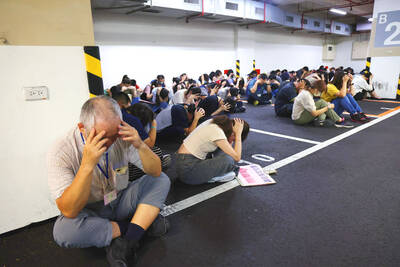Seventy-eight of the 134 Tibetans living in exile in Taiwan who applied for residency earlier this month have received permission to stay in the country.
The Mongolian and Tibetan Affairs Commission (MTAC) said the other 56 failed to make it because the commission could not verify their status as Tibetan refugees.
More than 100 Tibetans living in Taiwan without proper documents staged a sit-in demonstration at Liberty Square in Taipei last December, asking the government to grant them asylum.
The majority entered Taiwan on tourist visas using Indian or Nepalese passports — many of which were forged — several years ago.
In response, the Legislative Yuan passed amendments to the Immigration Act (入出國及移民法) authorizing the National Immigration Agency (NIA) to grant them residency once their Tibetan refugee status was verified by the MTAC.
After an initial review, about 110 Tibetans who took part in the demonstration received temporary, one-year residency permits so they could stay in Taiwan legally while their applications for permanent residency were being processed.
After the residency application and verification process began, more people applied, bringing the total to 134.
“We carefully examined each case. We collected documents, including passports, birth certificates, school diplomas and anything else that could prove their identity,” MTAC chief secretary Chien Shih-yin (錢世英) told the Taipei Times by telephone.
The applicants were interviewed by the NIA and the MTAC, while the MTAC double-checked their documents, Chien said, adding that it was during this process that the commission questioned the refugee status of the 56.
“We understand that they may not all have obtained their passports via the proper channels, so we asked them to provide other documents or contact information of families or friends in India or Nepal,” Chien said.
“We contacted these people and the issuing authorities for the documents and found that some of the applicants had not told the truth or given false information,” Chien said.
Some of them were found to be unfamiliar with either basic Tibetan phrases or Tibetan costumes.
“We understand that many of them grew up in exile and may not speak Tibetan fluently or have an in-depth understanding of Tibetan culture. But we found it hard to believe that some of them didn't even know what a khata is,” Chien said.
A khata is a traditional Tibetan scarf-like item made of silk and is used by Tibetans when giving guests, Buddhist masters or Buddhas a gesture of respect or welcome.
Chien said the 56 applicants may file an appeal if they could find more evidence to support their claim.
However, some Tibetans, who wished to remain anonymous, told the Taipei Times that only those who would “were on good terms with MTAC officials” were granted residency.
Dawa Tsering, chairman of the Tibet Religious Foundation of His Holiness the Dalai Lama and the de factor representative of the Tibetan government in exile in Taiwan, questioned the MTAC's verification process.
“The MTAC initially granted temporary residency to some 110 Tibetans, but now, about 20 to 30 of them did not pass the commission's second review,” Dawa said. “I don't understand this.”
When asked if he would help those rejected, Dawa said because the MTAC was founded on the belief that Tibet is part of the Republic of China, it was policy not to deal with it, but he added that they would do their best to help them.

Taipei on Thursday held urban resilience air raid drills, with residents in one of the exercises’ three “key verification zones” reporting little to no difference compared with previous years, despite government pledges of stricter enforcement. Formerly known as the Wanan exercise, the air raid drills, which concluded yesterday, are now part of the “Urban Resilience Exercise,” which also incorporates the Minan disaster prevention and rescue exercise. In Taipei, the designated key verification zones — where the government said more stringent measures would be enforced — were Songshan (松山), Zhongshan (中山) and Zhongzheng (中正) districts. Air raid sirens sounded at 1:30pm, signaling the

Environmental groups yesterday filed an appeal with the Executive Yuan, seeking to revoke the environmental impact assessment (EIA) conditionally approved in February for the Hsieh-ho Power Plant’s planned fourth liquefied natural gas (LNG) receiving station off the coast of Keelung. The appeal was filed jointly by the Protect Waimushan Seashore Action Group, the Wild at Heart Legal Defense Association and the Keelung City Taiwan Head Cultural Association, which together held a news conference outside the Executive Yuan in Taipei. Explaining the reasons for the appeal, Wang Hsing-chih (王醒之) of the Protect Waimushan Seashore Action Group said that the EIA failed to address

The number of people who reported a same-sex spouse on their income tax increased 1.5-fold from 2020 to 2023, while the overall proportion of taxpayers reporting a spouse decreased by 4.4 percent from 2014 to 2023, Ministry of Finance data showed yesterday. The number of people reporting a spouse on their income tax trended upward from 2014 to 2019, the Department of Statistics said. However, the number decreased in 2020 and 2021, likely due to a drop in marriages during the COVID-19 pandemic and the income of some households falling below the taxable threshold, it said. The number of spousal tax filings rebounded

A saleswoman, surnamed Chen (陳), earlier this month was handed an 18-month prison term for embezzling more than 2,000 pairs of shoes while working at a department store in Tainan. The Tainan District Court convicted Chen of embezzlement in a ruling on July 7, sentencing her to prison for illegally profiting NT$7.32 million (US$248,929) at the expense of her employer. Chen was also given the opportunity to reach a financial settlement, but she declined. Chen was responsible for the sales counter of Nike shoes at Tainan’s Shinkong Mitsukoshi Zhongshan branch, where she had been employed since October 2019. She had previously worked